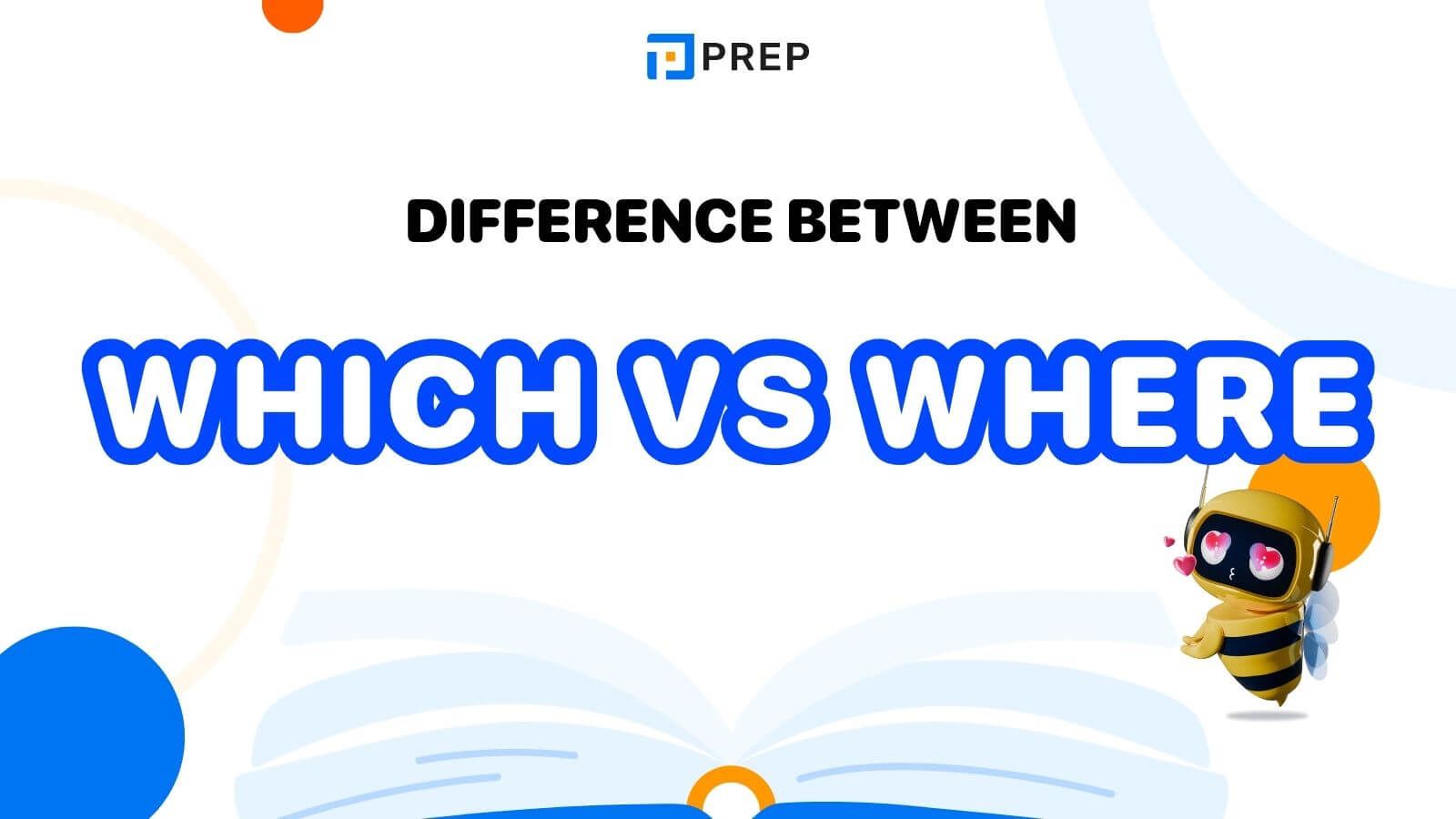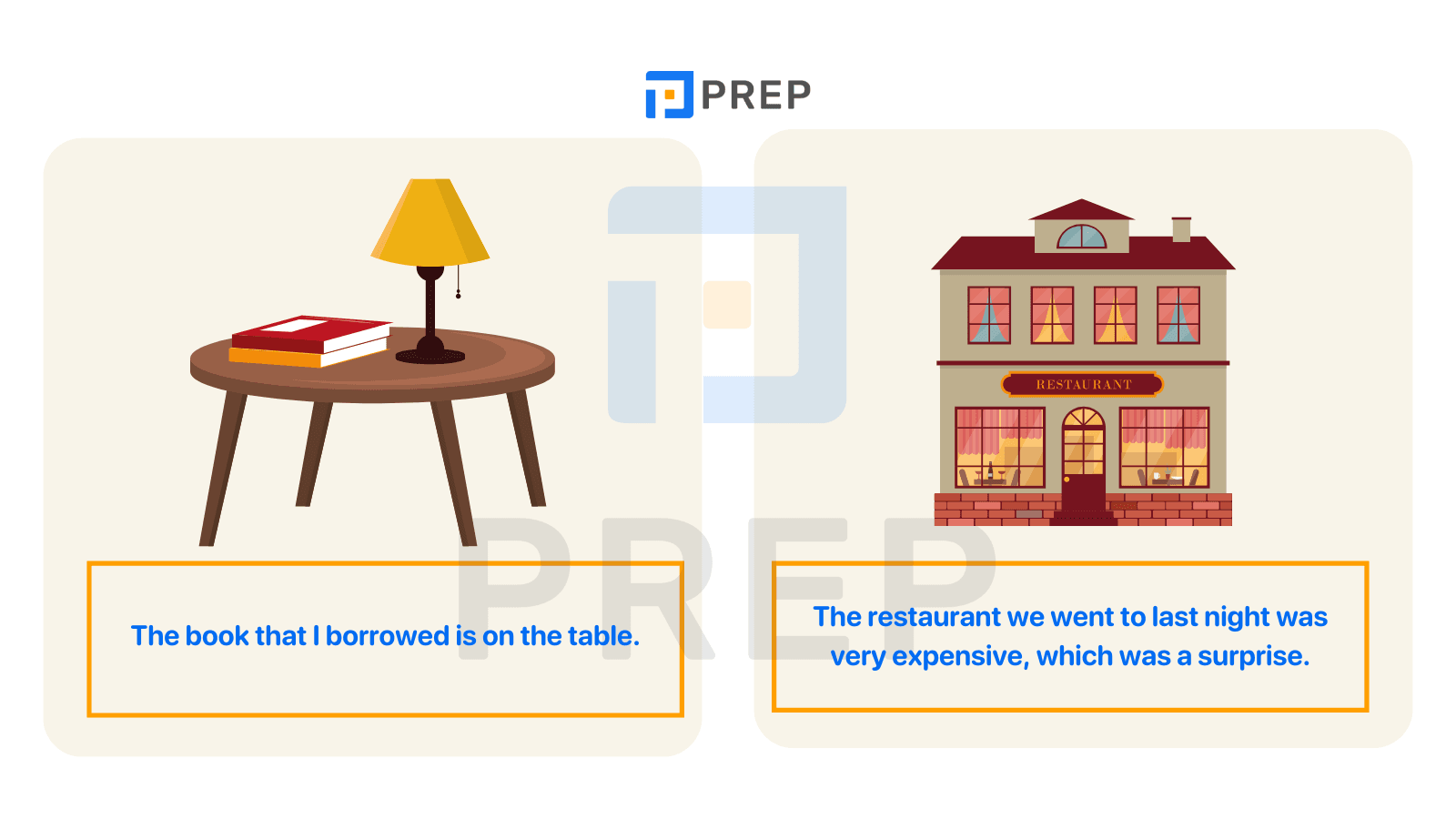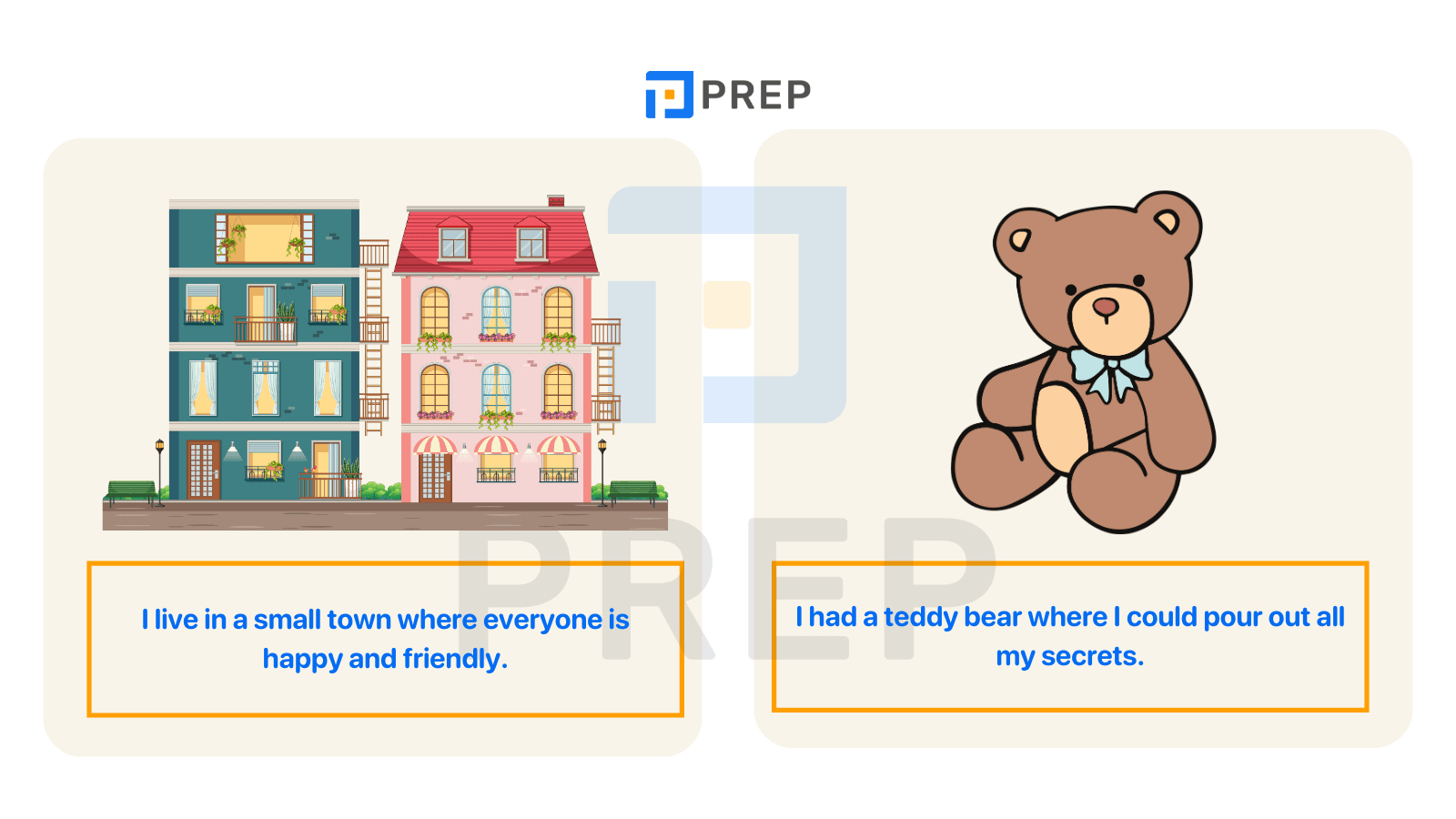Mastering Which and Where: Proper Usage in Relative Clauses
Learning to differentiate between "which and where" elevates your writing from ambiguous to sophisticated, though many English speakers find these apparently basic words challenging due to their distinct grammatical functions. While "which" relates to objects, concepts, and ideas serving as both an interrogative word and relative pronoun, "where" specifically connects to locations, places, and spatial contexts functioning as an interrogative and relative adverb. Knowing how to apply "which and where" appropriately showcases refined grammar knowledge that enhances your scholarly and professional communication to proficient standards.

I. Understanding Which
"Which" (/wɪtʃ/) is a multifaceted English word, operating as both an interrogative and relative pronoun. As an interrogative word, "which" helps choose from a particular set of recognized or restricted options, contrasting with "what," which applies to a wider or unspecified range. For example:
-
Which city do you think is the most beautiful in your country?
-
Which color dress do you prefer, blue or green?

This application proves especially valuable in comparative situations or when requesting particular choices, such as: Which method works better?
Apart from questions, "which" functions as a relative pronoun introducing relative clauses, usually referring to objects or things. It can serve as either the subject or object within the clause, and proper usage depends on the clause category:
Restrictive clauses (essential information): These specify or restrict the noun's meaning, require no commas, and in American English, frequently favor "that" over "which." Example:
-
The book that I borrowed is on the table.
Non-restrictive clauses (additional information): These provide extra, non-essential details and must be separated by commas. "Which" is always employed here. Example:
-
The book I bought yesterday is a mystery novel, which I find very interesting.
-
The restaurant we went to last night was very expensive, which was a surprise.
To employ "which" accurately, understanding the difference between which and where and applying punctuation guidelines correctly is essential. Frequent errors include incorrect comma placement or using "which" in restrictive clauses where "that" is more suitable in American usage.
Words/Phrases that go with Which:
|
Word/Phrase |
Meaning |
Example |
|
which is which |
used to ask about the difference between two or more things or people, or to express confusion about their identities. |
I have two identical twins. Can you tell me which is which? |
|
which way to turn |
used to describe a situation where someone is uncertain about what action to take or what direction to follow. |
I'm lost in this new city. Which way to turn to find the bus station? |
|
every which way |
in many different directions; in a confused manner; all over the place. |
The children's toys were scattered every which way after they played. |
|
the extent to which |
used to indicate the degree or level of something. |
I was surprised by the extent to which he was injured in the accident. |
|
know which side your bread is buttered on |
to be aware of what is beneficial for you or how to act in a situation to gain advantages. |
He always supports the boss because he knows which side his bread is buttered on. |
II. What is Where?
Like "which," the word "where" (/wer/) is a frequent pronoun in English, but it specifically addresses location. It performs various functions in English grammar, appearing in both questions and relative clauses, and can even function as a conjunction in particular contexts.
"Where" commonly appears at sentence beginnings as an interrogative pronoun, creating questions that address place, direction, or position:
-
Where did you study abroad?
-
Where should we meet?
-
Where are you heading?
-
Where is the most interesting place you have visited and stayed?
-
Where do you usually go to relax and slow your stress after work?

In relative clauses, "where" operates as a relative adverb, substituting for a noun that indicates a place. It links the main clause with supplementary information about a particular location, and is consistently followed by a clause:
-
I live in a small town where everyone is happy and friendly.
-
I remember a trip to the countryside where I learned how to make pottery.
-
Consider meeting at the cafe where we first met.
-
I had a teddy bear where I could pour out all my secrets.
Understanding where or which to use becomes clearer when you recognize that "where" can also substitute prepositional phrases involving place, creating smoother and more natural sentences:
-
in which → the city where she was born
-
at which → the spot where we parked
-
on which → the table where the keys were left
Furthermore, "where" may function as a conjunction in certain expressions, particularly when referring to metaphorical or emotional spaces:
-
a moment where everything changed
-
a place where I feel completely safe
By comprehending how "where" operates in both interrogative and descriptive structures, learners can utilize it more effectively and naturally when conveying ideas related to place or position.
Words/Phrases that go with Where:
|
Word/Phrase |
Meaning |
Example |
|
where someone is coming from |
to understand someone's perspective or background. |
I understand where you're coming from, but I still disagree with your point. |
|
where to turn |
to be in a difficult situation and not know what to do next. |
After losing my job, I didn't know where to turn. I was feeling lost and hopeless. |
|
where has/have something gone |
asking about the location or disappearance of someone or something. |
Where has my phone gone? I can't find it anywhere. |
|
what/where/how/why the devil |
used to express surprise or anger. |
What the devil is that noise coming from the kitchen? |
|
be where it's at |
to be in or to find a place that is active or interesting. |
If you want to be where it's at, you should go to the new club downtown. |
|
from where someone stands |
from the viewpoint or perspective of a person. |
From where I stand, it seems like a good decision. |
|
where the action is |
a place where there is a lot of activity or exciting events occurring. |
The new restaurant downtown is where the action is. It's always packed with people. |
|
hit someone where it hurts |
to attack or criticize someone at their weak point or vulnerability. |
He hit me where it hurts when he said I wasn't good enough. |
|
know where you stand |
to understand your situation or the opinions others have about you. |
I need to know where I stand with my boss before I ask for a raise. |
|
credit where credit is due |
to give recognition or acknowledgment to someone for their achievements or contributions. |
Credit where credit is due, he did a great job on that project. |
|
not know where to put yourself |
to feel confused or uncertain about what to do in a situation. |
I didn't know where to put myself when my boss praised me in front of my colleagues. |
|
hit someone where they live |
similar to "hit someone where it hurts," to attack a person's vulnerabilities. |
He hit me where it hurts when he said I wasn't good enough. |
|
where there's muck there's brass |
where there are difficulties, there will be opportunities. |
They say where there's muck there's brass, so I'm going to keep trying even though things are tough right now. |
|
where there's smoke there's fire |
if there are signs or rumors of something, there is usually some truth to it. |
Where there's smoke there's fire, so I think there's definitely something going on between them. |
|
be plenty more where someone/something came from |
there are many more of the same type or kind. |
Don't worry about the broken vase. There are plenty more where that came from. |
|
put your money where your mouth is |
to take action to support what you say; to back your words with actions. |
If you think you're so good, put your money where your mouth is and enter the competition. |
|
where there's a will there's a way |
if someone is determined to do something, they will find a way to accomplish it. |
Where there's a will there's a way, so don't give up on your dreams. |
III. Structural Patterns for Questions and Relative Clauses Using Which and Where
When should you use "which and where"? Here are the structural patterns that will help you understand how to apply "which and where" in relative clauses and questions.
1. Which
|
Which in questions |
|
|
Which + N + is/are + adj? |
|
|
Which + N + do/does + S + V? |
|
|
Which + do/does + S + V? |
|
|
Which + is/are + N? |
|
|
Which + of |
|
|
Which in relative clauses |
|
|
… N (thing) + which + V + O |
|
|
… N (thing) + which + S + V |
|
Notes: When the subject of the main clause is the object in the relative clause, the relative pronoun can be omitted from the sentence. For example:
-
Full Sentence: The report which I read yesterday was very interesting and comprehensive.
-
Reduced Sentence: The report I read yesterday was very interesting and comprehensive.
2. Where
|
Where in questions |
|
|
Structure |
Example |
|
Where + do/does + S + V? |
|
|
Where + is/are + S? |
|
|
Where in relative clauses |
|
|
… N (place) + where + S + V |
|
IV. Essential Distinctions Between Which and Where
The core difference between "which and where" determines grammatical correctness and semantic precision in professional communication. Understanding where vs which becomes crucial for advanced English writing.
|
Aspect |
Which |
Where |
|
Primary Function |
Questions about selection; relative pronoun for things/ideas |
Questions about location; relative adverb for places |
|
What They Connect |
|
Places Locations Positions Spatial references |
|
Grammatical Role |
|
|
|
Comma Considerations |
Commas with non-restrictive clauses only |
Generally no comma considerations |
|
Formal Alternatives |
"That" (restrictive), "in which" (formal) |
"In which/at which/on which" (when spatial) |
|
Common Errors |
|
|
|
Professional Usage |
Essential for complex academic writing |
Limited to spatial/locational contexts |
V. Practice Exercises to Differentiate Between Which and Where
Complete the following exercises to learn how to use these two words "which and where" correctly! These exercises will help you master the difference between which and where.
Exercise 1: Choose and fill in Which or Where appropriately.
-
This is the museum ______ we saw ancient Egyptian artifacts.
-
The apartment ______ he rented last month has a broken heater.
-
I remember the day ______ we had our first picnic.
-
They visited the school ______ her father used to teach.
-
The shop ______ sells handmade shoes is very popular in this area.
Exercise 2: Use Where or Which to connect the following sentences.
-
She stayed in a hotel. It had a beautiful sea view.
-
We bought a book. It explains how to bake sourdough bread.
-
He went back to the village. He was born there.
-
The company hired a designer. She created the new logo.
-
I remember the café. We met there for the first time.
Answer keys:
|
Exercise 1 |
Exercise 2 |
|
|
The command of "which and where" signifies more than basic grammar rules—it demonstrates your dedication to accurate, professional communication that honors your readers and strengthens your credibility. Bear in mind that "which" addresses things and concepts while "where" addresses places and locations, a core distinction that influences every usage choice. By consistently implementing these principles of "which and where" in your writing, you become part of the community of skilled communicators who recognize that grammatical accuracy creates clarity, establishes trust, and exhibits the type of meticulousness that separates genuine language professionals from casual users.

Hi I'm Chloe, and I am currently serving as an Product Content Administrator at Prep Education. With over five years of experience in independent online IELTS study and exam preparation, I am confident in my ability to support learners in achieving their highest possible scores.
Comment
Premium content
View allPersonalized roadmap
Most read












